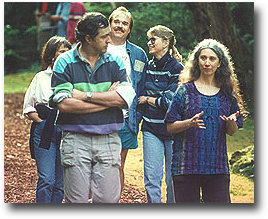 The Cultural Maturity website is one of series presented by the Institute for Creative Development. ICD is a non-partisan think tank and center for advanced leadership training dedicated to clarifying and supporting the kind of understanding and leadership a vital future will require. The concept of Cultural Maturity addresses the challenge of making sense of the times we live in and the capacities needed to have a healthy and vital human future. The Cultural Maturity Blog engages this challenge through regular blog posts and interactive discussion. Charles Johnston’s book Hope and the Future provides an introduction to the concept of Cultural Maturity for a general audience. His upcoming work Cultural Maturity: A Guidebook for the Future offers a more detailed examination for those interesting in developing the new kinds of leadership capacities Cultural Maturity’s changes make possible. This site provides a basic overview of the concept.
The Cultural Maturity website is one of series presented by the Institute for Creative Development. ICD is a non-partisan think tank and center for advanced leadership training dedicated to clarifying and supporting the kind of understanding and leadership a vital future will require. The concept of Cultural Maturity addresses the challenge of making sense of the times we live in and the capacities needed to have a healthy and vital human future. The Cultural Maturity Blog engages this challenge through regular blog posts and interactive discussion. Charles Johnston’s book Hope and the Future provides an introduction to the concept of Cultural Maturity for a general audience. His upcoming work Cultural Maturity: A Guidebook for the Future offers a more detailed examination for those interesting in developing the new kinds of leadership capacities Cultural Maturity’s changes make possible. This site provides a basic overview of the concept.
The short version: The concept of Cultural Maturity presents a sophisticated guiding framework for making sense of and addressing the core tasks of our time. It provides a no-nonsense, yet compelling general guiding story, one able to get beyond familiar political, religious, and philosophical ideologies. And it goes further to offer detailed theoretical perspective for confronting the critical personal and cultural challenges ahead and separating wheat from chaff with regard to the kind of thinking the future will require.
news
Nine recent books by Charles Johnston are now out and available in both print and e-book form. (See www.charlesjohnstonmd.com for full descriptions and other earlier works.)
Intelligence’s Creative Multiplicity: And Its Critical Role In the Future of Understanding examines cognitions underlying structures.
Insight: Creative Systems Theory’s Radical New Picture of Human Possibility addresses what is specifically new and important in the thinking of Creative Systems Theory.
Creative Systems Theory: A Comprehensive Theory of Purpose, Change, and Interrelationship in Human Systems is the complete work on Creative Systems Theory.
Perspective and Guidance for a Time of Deep Discord: Why We See Such Extreme Social and Political Polarization—and What We Can Do About Itaddresses one of our time’s most pressing concerns.
Rethinking How We Think: Integrative Meta-Perspective and the Cognitive “Growing Up” On Which Our Future Depends is a short book that addresses the cognitive reordering that underlies culturally mature understanding.
On the Evolution of Intimacy: A Brief Exploration of the Past, Present, and Future of Gender and Love(See www.hopeandthefuture.com/intimacy) addresses some of our times most provocative questions from a culturally mature perspective.
Hope and the Future: Confronting Today’s Crisis of Purpose (See www.HopeandtheFuture.com/hope.) is a short book (135 pages) written for a general audience. It provides the best place to begin for those interested in the concept of Cultural Maturity. This is a second edition with a updates and a new preface.
Cultural Maturity: a Guidebook for the Future (with an Introduction to the Ideas of Creative Systems Theory) is a more lengthy effort (630 pages) intended for those interested in an in-depth emersion in culturally mature perspective.
Quick and Dirty Answers to the Biggest of Questions: Creative Systems Theory Explains What It Is All About (Really) (See www.creativesystems.org/icd-press/qdabq/.) (130 pages) describes how culturally mature perspective helps us address overarching questions that have always before left us baffled.
—————
Cultural Maturity
The concept of Cultural Maturity proposes that questions we face today are not just new and difficult, they require us think and act in some fundamentally new ways. We can understand the concept both as a general notion that helps us get at what challenges of all sorts today ask of us and as a starting point for bringing a needed new sophistication to how we live our personal and collective lives. It is pertinent to people from all walks of life committed to a healthy human future.
The phrase captures a basic sense of what is being asked: Our times challenge us to a critical kind of “growing up” as a species. Cultural Maturity is not as easy a notion as a phrase like growing up might suggest. But when understood deeply, the concept offers a powerful overarching framework for understanding the times we live in and the tasks ahead. The concept of Cultural Maturity describes how our times demand—and make possible—a critical new chapter in the human story.
The concept assists us at multiple levels. At a time when familiar cultural guideposts and narratives are loosing their past reliability, it provides a practical and compelling guiding narrative for our time. At a more detailed level it provides focused perspective for making sense of needed changes in the values we hold, in how we relate, and in how we think. And it serves as a tool for critique and analysis, for identifying ideas that can help us with the challenges ahead and understanding why others stop short. (Cultural Maturity proposes that many of the ways of thinking we are most apt to draw on, both traditional and new on the scene, not only leave us short of needed answers, they lack the kind of perspective needed if we are to adequately grasp the questions.)
The concept of Cultural Maturity is not easy in all it asks of us. It demands hard-nosed confrontation with the magnitude of the challenges ahead and questions simplistic answers of all sorts. But while demanding, at the same time, the concept of Cultural Maturity provides a powerful antidote to cynicism. At the least it offers hope that the challenges of our time can be met (if we can bring to bear the creativity and commitment the this needed next chapter in our human narrative will require). More than that, it offers the possibility of a future that is not only positive and compelling, but profound.
We can arrive at the thesis of Cultural Maturity simply by looking closely at the questions that today confront us and what they ask of us. We can also arrive at it more theoretically. Cultural Maturity had it origins as a concept in the thinking of Creative Systems Theory, a comprehensive framework for understanding change and interrelationships in human systems developed by psychiatrist and futurist Charles M. Johnston MD in conjunction with ICD colleagues over the last thirty years. CST helps bring nuance to the concept of Cultural Maturity, but its thinking is not needed to make good use of the concept’s perspective. (A web site dedicated to the ongoing development of CST can be found atwww.CSTHome.org).
The Site
Overview: The Overview section addresses why a concept like Cultural Maturity is needed, what exactly Cultural Maturity asks of us, and how the concept differs from more familiar ways of framing the task of our time. It presents a layered inquiry that lets people engage the concept at the depth that they will find most useful.
FAQ: The FAQ section uses questions commonly asked by those new to the notion of Cultural Maturity to introduce the concept.
“God-like” Questions: This section examines some of the newly demanding questions our times present and how fundamentally more mature ways of thinking, relating and acting will be needed to address them effectively.
Defining Themes: Here we look at common themes that run through culturally mature thought and action.
Cognitive Reordering: He we look at the developmental processes that produce Cultural Maturity’s new chapter in the human story and the cognitive changes that underlie them.
Culture in Evolution: This section links the concept of Cultural Maturity with the change-related formulations of Creative Systems Theory.
Dilemmas, Myths, Paradoxes, and Surprises: Apparent contradictions reconciled by culturally mature perspective provide some of the best evidence for the concept of Cultural Maturity and some of the best avenues for making sense of how its changes alter understanding.
Compare and Contrast: Here we compare and contrast the concept of Cultural Maturity with other ways of looking at what our time demand of us and examine ways our thinking can go astray as we look to the future. One of the best ways to grasp what Cultural Maturity is about is to use its perspective to evaluate the contributions and significance of familiar viewpoints.
Education Videos: Charles Johnston is in the process of putting together a new video series that addresses some of the more important implications of culturally mature perspective and leadership and also aspects of Creative Systems Theory that have particular direct implications for our time.
Hands-On Approaches: Hands-on approaches often provide the most direct route to culturally mature perspective. They also offer simple ways to understand what cultural mature perspective is about and to distinguish Cultural Maturity’s conclusions from other ways of understanding.
Applications: This section applies the concept of Culturally Maturity to critical questions—from everyday concerns, to the challenge of leadership, to changes reordering whole cultural domains. to big picture philosophical quandaries,
Resources: The resources section includes information about other sources for learning about the concept of Cultural Maturity and culturally mature leadership.



